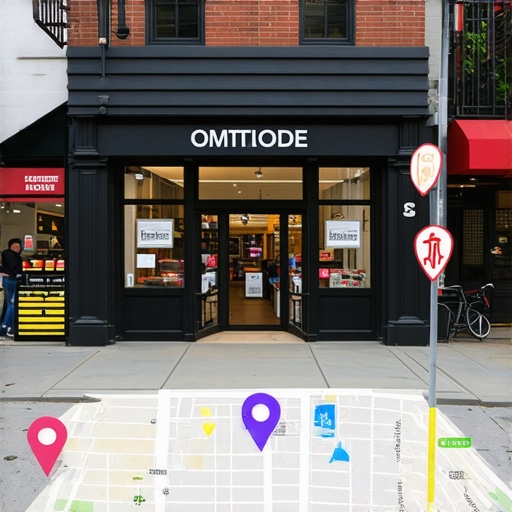Are Your Google My Business Listings Playing Hard to Get?
If you’ve ever felt like your local business is stuck in a digital fog, you’re not alone. Many entrepreneurs overlook the secret sauce that can catapult their visibility—Google My Business (GMB) optimization. Imagine walking into a bustling neighborhood café, only to find it hidden behind a foggy window. That’s what poor local SEO feels like online. But fear not! With a few strategic tweaks, your GMB profile can become the shining beacon that draws local customers like moths to a flame.
The GMB Goldmine: Why It’s More Than Just a Listing
Think of your GMB profile as your digital storefront. It’s where potential customers first encounter your brand—reviews, photos, hours of operation, and more. But here’s the kicker: many local businesses have a GMB profile that’s as neglected as an abandoned store. The result? Missed opportunities and lost revenue. According to Moz’s Local Search Ranking Factors, GMB signals are a significant component of local search algorithms, making it a no-brainer to optimize your profile.
What’s the Secret Sauce? Proven Strategies for GMB Optimization
Is Your NAP Consistent? Or Are You Playing Hide and Seek?
Consistency is king. Your Name, Address, and Phone Number (NAP) must be uniform across all online platforms. Discrepancies confuse search engines and customers alike. Double-check your listings and ensure your info matches your website, social media, and directories. It’s a simple step that pays dividends in local search rankings.
Plus, adding fresh content regularly—like new photos or posts—keeps your profile active and engaging. Search engines love active profiles, and so do potential customers. Want to see how others are crushing it? Check out Effective Local SEO Services for inspiration.
Can Your Business Shine Bright in Local Search?
Absolutely, but only if you harness the power of reviews. Encourage satisfied customers to leave positive feedback. Respond to reviews promptly—show you care. This not only boosts your reputation but also signals to Google that your business is active and trustworthy.
And don’t forget the importance of local keywords. Incorporate them naturally into your profile description and posts. For instance, if you’re a bakery in Brooklyn, sprinkle phrases like “best Brooklyn bakery” or “fresh pastries in Brooklyn” to attract local searchers.
Ready to Elevate Your Local Search Game?
Optimizing your GMB profile isn’t a one-and-done task. It’s an ongoing process that requires attention and strategy. If you’re eager to learn more, explore GMB Optimization Secrets and unlock the full potential of your local presence.
So, fellow business warrior, are you ready to turn your GMB profile into a local search magnet? Share your thoughts in the comments below—let’s grow together!
Could Your GMB Profile Be Underperforming Due to Overlooked Optimization Opportunities?
Many local business owners focus on basic GMB setup but miss out on nuanced strategies that can dramatically enhance visibility. For example, leveraging Google Posts effectively, integrating UTM parameters for tracking, and utilizing Google Q&A to engage potential customers are often overlooked yet highly impactful tactics. These methods not only improve local rankings but also foster deeper engagement with your audience.
Why Do Some GMB Profiles Outshine the Competition Even in Saturated Markets?
According to Moz, local pack rankings are influenced by a complex blend of signals, including reviews, citations, and engagement metrics. But beyond these, the integration of structured data and schema markup on your website plays a crucial role. Implementing local business schema can help search engines better understand your offerings, leading to enhanced visibility in local searches. For more on this, explore effective local SEO services.
How Can Advanced GMB Optimization Techniques Propel Your Business Beyond Basic Listings?
Advanced tactics such as creating a Google My Business website, utilizing Google My Business Insights to refine your strategy, and actively managing your profile’s Q&A section can set you apart. These strategies build trust and demonstrate authority, which are critical factors in Google’s local algorithm. Additionally, optimizing your profile with local keywords that reflect the intent of nearby searchers can boost your relevance. If you’re wondering how to implement these advanced strategies, consider consulting top SEO service strategies.
Furthermore, engaging your community through local events and encouraging customers to share their experiences can generate fresh content and social proof, both of which are powerful ranking signals. Consistent updates and active engagement signal to Google that your business is vibrant and trustworthy.
What Are the Practical Steps to Take Your GMB Optimization to the Next Level?
Start by conducting a comprehensive audit of your current profile against industry benchmarks. Use tools like expert GMB optimization tips to identify gaps. Next, implement structured data on your website to improve how your business information is displayed in search results. Regularly update your profile with new photos, posts, and offers to keep your listing fresh and engaging. Remember, the key is consistency and active management.
If you’re ready to dive deeper into GMB mastery, I recommend exploring proven GMB optimization tips that can help you fine-tune your approach and dominate local search results.
Share your experiences or ask questions in the comments—let’s create a vibrant community of local SEO enthusiasts eager to grow their businesses!
Mastering Structured Data: The Next Frontier in GMB Optimization
While many local businesses focus on optimizing their Google My Business profiles through reviews and images, an often-overlooked strategy involves implementing structured data markup, specifically LocalBusiness schema, on your website. This technical enhancement is like giving search engines a detailed blueprint of your offerings, helping them understand your business context more precisely. According to Search Engine Journal, leveraging schema markup can increase your visibility in local packs by clarifying your business type, services, and geographical relevance, thus boosting your chances to outrank competitors who neglect this tactic.
How does schema markup influence local search algorithms?
Schema markup acts as a semantic layer that communicates your business details directly to search engines, reducing ambiguity. When search engines ingest this structured data, they can display rich snippets—such as star ratings, event details, or product information—directly in search results. These enhanced listings are more eye-catching and can significantly improve click-through rates. For example, a bakery implementing local schema can appear with reviews, opening hours, and menu highlights right in the search results, making it irresistible to local customers.
To effectively implement schema markup, use tools like Google’s Structured Data Markup Helper or Schema Pro, and validate your code with tools like Google’s Rich Results Test. Incorporating this data isn’t just about SEO; it’s about creating a comprehensive digital ecosystem that communicates trustworthiness and relevance to both users and search engines.

Harnessing Local Community Engagement for SEO Amplification
Beyond technical optimizations, engaging your local community acts as a catalyst to amplify your GMB efforts. Hosting or participating in local events, sponsoring community initiatives, or collaborating with neighboring businesses can generate authentic user-generated content and backlinks—both of which are critical ranking signals. Moreover, when customers share their experiences on social media or review platforms, they create a ripple effect that enhances your local authority.
Encourage patrons to share their stories and tag your business, which can lead to valuable social proof and increased visibility in local searches. Additionally, actively managing and responding to reviews—especially negative ones—demonstrates your commitment to customer satisfaction and builds trust with both Google and prospective clients. As Moz emphasizes, engagement metrics like review responses and community involvement are increasingly weighted in local ranking algorithms.
What innovative ways can small businesses leverage community engagement for SEO?
Innovative strategies include creating local ambassador programs, hosting community-focused content contests, or developing hyper-local landing pages tailored to neighborhood events. These initiatives not only foster goodwill but also generate fresh content and backlinks that boost your SEO profile. For example, a local gym could feature success stories from community members or promote local sports events, positioning themselves as an integral part of the neighborhood fabric.
In conclusion, integrating advanced technical tactics like schema markup with active community engagement creates a synergistic effect that propels your Google My Business profile from mere listing to local search dominance. To unlock these strategies, consider consulting with local SEO experts or utilizing comprehensive tools designed for technical optimization, ensuring your business stays ahead in the competitive local landscape. Ready to take your GMB game to the next level? Dive deeper into these advanced tactics and start transforming your local presence today.
Unlocking the Power of Structured Data: Elevate Your GMB Visibility with Schema Markup
While many businesses focus on reviews and visuals, the technical side of GMB optimization often remains overlooked. Implementing schema markup, particularly LocalBusiness schema, acts as a sophisticated signal to search engines, helping them understand your offerings more precisely. This not only enhances your appearance in local packs but can also lead to rich snippets that outshine competitors. According to Search Engine Land, schema markup can significantly improve your click-through rate by providing search engines with detailed context about your business—think of it as giving them a detailed blueprint of your operations.
How does schema markup reshape your local SEO landscape?
Schema markup functions as a semantic layer that communicates your business details directly to search engines. By clearly defining your business type, services, and location, it reduces ambiguity and increases the chances of your business appearing with enhanced listings, such as star ratings, menus, or event details. These rich snippets capture the attention of local searchers, making your listing more compelling and trustworthy. To implement this effectively, tools like Google’s Structured Data Testing Tool can validate your code and ensure optimal display in search results.

Leveraging Hyper-Local Content to Cement Your Market Niche
Beyond technical optimizations, creating hyper-local content tailored to your community can dramatically boost your GMB profile’s relevance and authority. Develop content such as neighborhood-specific blog posts, local event sponsorship pages, or testimonials from local customers. This approach signals to Google that your business is a dedicated part of the community fabric. Moreover, local content encourages engagement—think of it as planting seeds that grow into backlinks and social shares, which are crucial for ranking higher. Moz emphasizes that localized content is one of the most effective ways to stand out in saturated markets, especially when combined with strategic keyword placement and community involvement.
What innovative local content strategies can small businesses deploy for maximum impact?
Creative strategies include hosting virtual local tours, developing neighborhood guides, or partnering with local influencers for co-created content. These initiatives foster authentic engagement and generate user-generated content that Google values highly. For example, a boutique could feature stories about local artisans or spotlight upcoming community events, positioning itself as a local authority. Consistency in publishing such content not only enriches your profile but also creates a dynamic digital presence that search engines and potential customers will appreciate. To explore more about crafting impactful local content, visit top local search strategies.
Expert Insights & Advanced Considerations
1. Schema Markup as a Trust Signal
Implementing LocalBusiness schema markup on your website acts as a detailed blueprint for search engines, significantly enhancing your visibility in local packs and rich snippets. This technical layer communicates your offerings precisely, reducing ambiguity and boosting your chances of outranking competitors who neglect structured data.
2. Community Engagement as a Ranking Catalyst
Active participation in local events, sponsorships, and collaborations with neighborhood businesses creates authentic backlinks and user-generated content. These engagement signals are increasingly influential in local search rankings, demonstrating your business’s integral role in the community fabric.
3. Hyper-Local Content Strategies
Developing neighborhood-specific blogs, local event pages, and testimonials from local customers signals relevance and authority. Such content fosters engagement, social sharing, and backlinks, amplifying your GMB profile’s strength in local search results.
4. Continuous Optimization & Monitoring
Regular audits of your GMB profile, leveraging insights and tracking tools, ensure your listing remains competitive. Updating visuals, posts, and responding to reviews consistently keeps your profile active and signals vitality to search engines.
5. Advanced Use of Google Posts & Q&A
Strategically utilizing Google Posts with targeted local keywords and actively managing the Q&A section can engage potential customers and improve CTR. These dynamic elements serve as real-time signals of activity and relevance.
Curated Expert Resources
- Google’s Structured Data Guidelines: Essential for understanding schema markup implementation and best practices.
- Moz Local Search Ranking Factors: Offers comprehensive insights into what influences local pack rankings and how to optimize for them.
- Search Engine Journal’s Structured Data Resources: Provides in-depth tutorials and latest trends on schema markup and its impact on SEO.
- RankSearchNow’s Local SEO Tools: Practical tools for auditing, tracking, and optimizing your local search presence effectively.
- Local SEO Community Forums: Engaging with industry experts and sharing insights to stay ahead of emerging trends.
Final Expert Perspective
Mastering Google My Business optimization in 2024 demands a sophisticated blend of technical finesse, community engagement, and strategic content. Implementing schema markup, fostering local relationships, and continuously refining your profile are the cornerstones of local search dominance. Remember, in the intricate dance of local SEO, staying proactive and embracing evolving strategies will keep your business shining brightly in your community. Dive deep into these advanced tactics and share your insights—your expertise could be the spark that transforms another local business’s success story.




This post really hits home for me—I’ve seen how diligently optimizing GMB profiles can make a noticeable difference in local visibility. One thing I’ve learned through my own experience is the importance of regularly updating Google Posts and engaging with customer reviews. It creates a living profile that search engines favor, and customers appreciate the active communication. I’m curious, how do you all manage the time needed to maintain these ongoing efforts? Do you use any specific tools or strategies to streamline the process? For small businesses, staying consistent can be challenging, but I believe it pays off when done right. Moreover, I’ve started experimenting withschema markup on my website, and it’s fascinating how much more clearly search engines understand my business now. Have others here tried implementing schema beyond basic local info? Would love to hear about your experiences and any tips for maximizing these advanced tactics—sometimes, just a little technical tweak can provide a huge boost in local rankings.
This article really underscores the importance of a comprehensive approach to GMB optimization. I’ve personally seen how regular updates and community engagement can elevate a business’s local presence. One tactic I’ve found useful is using Google Posts to highlight limited-time offers or community events, which keeps the profile fresh and relevant. It’s also surprisingly effective to monitor and respond to reviews promptly—this not only improves your reputation but also signals activity to Google.
The section about schema markup resonated with me, as I started experimenting with LocalBusiness schema on my website and noticed a slight boost in visibility. Has anyone here integrated schema markup with Google Posts or Q&A sections? I wonder if combining these strategies creates a compounded effect in local rankings. I’d love to hear how others are managing the ongoing process, especially small business owners balancing daily operations with SEO efforts. Any tools or automation tips you’d recommend? Continuing education on technical elements like schema seems crucial as local SEO evolves.
This post hits so many points I’ve seen firsthand in my own business journey. Consistent management of a GMB profile, especially responding to reviews and keeping content fresh, can be a real game changer. I’ve started using scheduling tools to keep Google Posts regular, which really helps manage my time better without sacrificing ongoing engagement. Also, implementing schema markup was initially intimidating, but I saw tangible results pretty quickly, especially with rich snippets that stand out in local searches. One thing I’ve been exploring lately is how to better leverage Google Q&A—answering common questions proactively can position your business as helpful and authoritative. Have others experimented with using Google Posts to highlight community involvement or special events? I feel that showcasing local effort not only boosts visibility but also fosters community loyalty. Curious to hear what strategies everyone finds most effective when balancing SEO tactics with day-to-day operations.
This post really underscores the crucial role of consistency and strategic engagement in local SEO. From my experience managing a few small shops, I’ve found that regularly updating and responding to reviews can create a dynamic GMB profile that genuinely attracts local customers. I’ve also started to dive into schema markup and how it can improve visibility through rich snippets. What I wonder is how small businesses can integrate these advanced tactics without overwhelming their daily operations. Are there automation tools or simple workflows that can make this process more manageable? For example, some of my clients use scheduling tools for Google Posts and automated review responses, which helps maintain activity without much additional effort. Also, I’m curious about the integration of schema with other local SEO strategies—has anyone seen significant benefits from combining structured data with community engagement efforts? I’d love to hear your insights or experiences on balancing technical SEO with ongoing community interaction.